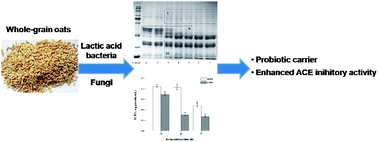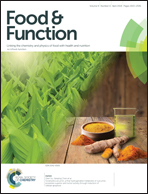Whole-grain oats (Avena sativa L.) as a carrier of lactic acid bacteria and a supplement rich in angiotensin I-converting enzyme inhibitory peptides through solid-state fermentation
Abstract
This study explored a novel strategy to develop solid-state whole-grain oats as a novel carrier of lactic acid bacteria and a nutraceutical supplement rich in ACE inhibitory peptides. Oats were fermented by Lactobacillus plantarum B1-6, Rhizopus oryzae, or a combination of L. plantarum B1-6 and R. oryzae. L. plantarum showed a much better growth performance in oats when it was combined with R. oryzae than when it was cultured alone, as evidenced by an increase in viable cell count to 9.70 log cfu g−1 after 72 h of fermentation. The coinoculated fermented oats (CFO) and the R. oryzae-fermented oats (RFO) were then selected for investigations on protein hydrolysis and on the functional properties of the released bioactive peptides. The results showed that the soluble protein contents changed from 7.05 mg g−1 to 14.43 and 10.21 mg g−1 for CFO and RFO, respectively. However, the degree of hydrolysis and the content of peptides with molecular masses less than 10 000 Da indicated that the CFO proteins can be degraded to a greater degree. As analyzed by electrophoresis and reversed-phase high-performance liquid chromatography, the protein and peptide profiles of CFO and RFO demonstrated that the proteins from CFO were more obviously hydrolyzed and more small peptides were obtained. In addition, both CFO and RFO presented higher ACE inhibitory activities than unfermented oats, whereas the protein extracts from CFO exerted a lower IC50 value of 0.42 mg protein per mL compared with the protein extracts from the other samples. This research has broadened our knowledge on the development of whole-grain oat products as a probiotic carrier and on the difference between mixed solid-state fermentation (SSF) and fungi SSF in terms of protein degradation and the capacity to release ACE inhibitory peptides. Our approach could be used to obtain probiotic food products and probably to develop oats as a potential therapeutic ingredient targeting hypertension.



 Please wait while we load your content...
Please wait while we load your content...